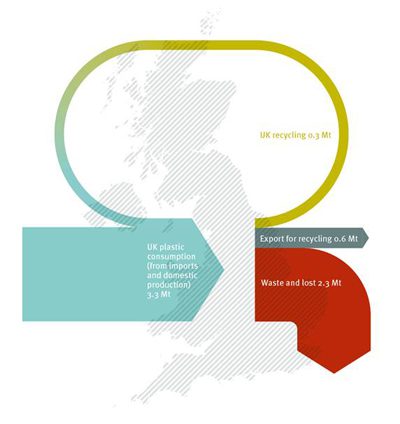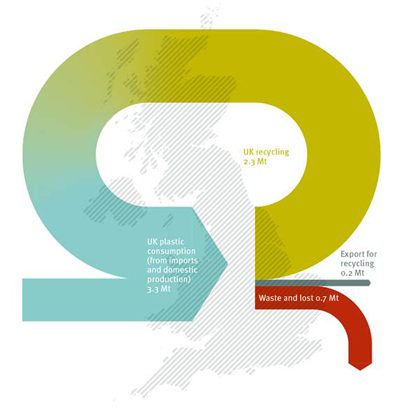
The UK currently exports two thirds of plastic collected for recycling and only recycles nine per cent of all plastics domestically. But new analysis shows the government could be developing secondary material markets that encourage an additional two million tonnes of plastic to be recycled in the UK. This could provide 71 per cent of the raw material needed by UK manufacturers of plastic packaging and products.
The report, by Green Alliance for the leading business group the Circular Economy Task Force, argues that the government’s focus on recycling targets only, which simply ‘push’ material into the waste management system, fails to develop a market for the plastic collected. This leads to a waste of valuable resources and serious pollution problems. These market failures have led to over reliance on virgin materials, to the detriment of the environment, industry and the economy.
It recommends three new measures to complement recycling targets and make sure much more plastic is recovered in the UK and ‘pulled’ as raw material back into manufacturing. These are:
· Mandatory recycled content requirements for all plastic products and packaging.
· Short term support to kickstart the plastic reprocessing market.
· A market stabilisation fund to derisk investment in the market.
The report recommends new policy to overcome technical barriers. It says, to ensure a reliable market, long term strategy should provide certainty for investors, facilitate new collaborative problem solving and ratchet up ambition over time.
Nick Lakin, group director of corporate affairs at Kingfisher plc, said:
“Recycling policy that focuses on increasing the amount of material collected is important but it still doesn’t encourage reliable secondary markets for the materials once they are collected. Kingfisher wants to ensure the sustainable management and efficient use of key resources in our products. As this report shows, the government needs to put policies in place to help businesses like ours access more sustainable materials.”
Dan Cooke, director of regulatory affairs at Viridor, said:
“It’s encouraging to now see leading brands and British industry recognising the need for higher levels of recycling, and the benefits that greater resource security will bring to a productive UK economy. Viridor has invested in a network of recycling and reprocessing facilities, including our specialised plastics plants, and the company is looking to do more.
“There’s now a real opportunity for the government to deliver an ambitious strategy, backed up by effective regulation, to stimulate sustained demand for recycled content in the UK. This is absolutely vital to unleash innovation, and to enable further investment in essential recycling infrastructure to supply our industries and economy in the years ahead.”

Peter Maddox, director of WRAP UK, said:
“The time has come for the UK to take more responsibility for its own waste. At WRAP, our mission is to create a world where resources are used sustainably. To make this happen in the UK, we need to design circular systems for plastics and other materials that are sustainable both economically and environmentally. This will require some fundamental changes from all of us. The UK government has shown ambition in its 25 year environment plan and has a great opportunity through the forthcoming resources and waste strategy to ensure that the policy framework enables a thriving and commercially successful UK recycling sector to capture the value from waste here at home.”
Dr Colin Church, CEO of CIWM, the professional body for resource and waste management, and chair of the Circular Economy Task Force, said:
“There are currently some significant failures, in resource terms, in the way plastics are used and managed at the end of life stage. Tackling this will require action from all of us – designers, manufacturers, retailers, consumers and resource managers. The resource and waste management sector is more than ready to play its part, but it cannot act alone. It needs the right policy framework and the right partnerships to allow it to bring its skills, energy and imagination to bear.”

Libby Peake, senior policy adviser on resources at Green Alliance, said:
“If the UK wants to lead the world in addressing the global scourge of plastic pollution, that means creating a circular economy at home that allows us to turn discarded plastics back into new products. Just collecting plastic and shipping it abroad doesn’t solve the problem.”







